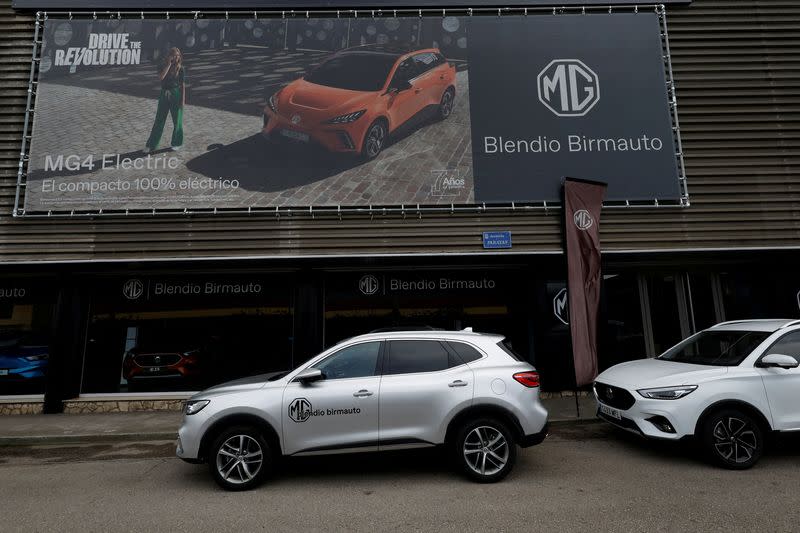What happens next in the EU investigation into Chinese EVs?

By Philip Blenkinsop
BRUSSELS (Reuters) - EU regulators will impose provisional duties on Chinese-made electric vehicles (EVs) imported into the European Union from Friday, without backdating, they said, risking retaliation from Beijing.
The European Commission, which oversees EU trade policy, announced duties of between 17.4% and 37.6%, almost the same as those disclosed in June. The executive made adjustments after companies identified minor calculation errors in the initial disclosure.
These are on top of the EU's standard 10% tariff for car imports.
WHAT ARE PROVISIONAL MEASURES?
Provisional duties can be imposed for a maximum of nine months after the start of an EU anti-subsidy investigation if the Commission concludes it needs to prevent injury to EU industry.
They can be applied for up to four months, by which point the Commission will decide whether to apply final duties, known as definitive duties. In the EV case, the deadline for this is Nov. 2.
Provisional duties are only collected if definitive duties are imposed at the end of the investigation. If definitive duties are lower or not applied, then provisional duties are adjusted down accordingly. Until then, customs authorities normally just require a bank guarantee from importers.
WHAT HAPPENS NEXT?
The European Commission has held technical talks with Chinese officials and said that any negotiated outcome must effectively address the injurious subsidies.
After the announcement of provisional duties in the EU official journal, detailing the ongoing investigation and its findings, interested parties such as China and EV producers have until July 18 to comment. They can also request a hearing.
The Commission already visited more than 100 sites of automakers in China and Europe and done the bulk of its investigation.
Its final report generally reads as a confirmation of its provisional findings, with possible adjustments following comments received.
Definitive duties are often a little lower than the provisional rates, reflecting an acceptance of some of these arguments.
One new element will be Tesla's request the Commission calculate a separate duty rate for it.
The largest EV exporter from China to Europe will want to have a lower rate than the 20.8% for companies that have cooperated with the investigation, a group it is in.
As an alternative to duties, exporters can commit to selling their products at or above a minimum price. Chinese exporters agreed such an undertaking in the case of solar panels a decade ago. However, cars are not commodities, so it is hard to see how a minimum price could be applied.
WHO DECIDES?
At the provisional stage, the Commission has full power to impose duties, although it consults EU members and is supposed to take their positions into account. They are to submit their positions by July 15.
EU members wavering over whether to back additional tariffs on Chinese-built electric vehicles, highlighting Brussels' challenge in building support for its largest trade case yet as Beijing threatens wide-ranging retaliation.
At the end of the investigation, the Commission can propose definitive duties, normally applying for five years.
Its proposal could be blocked if a qualified majority of the European Union's 27 members is opposed. A qualified majority means 15 EU members representing 65% of the EU population. In most cases, there is no blocking majority.
WHAT HAPPENS AFTER THE INVESTIGATION?
Any company not in the sample group of BYD, Geely and SAIC that wishes to have its own individual duty can ask for an "accelerated review" just after the imposition of definitive measures. Such a review should last a maximum of nine months.
The Commission can also carry out an "interim review" after a year has elapsed if the measures are no longer necessary or if they are not sufficient to counteract subsidies.
The Commission itself often looks into whether producers are evading duties via exports of parts for assembly elsewhere. For the EU, such circumvention exists if 60% or more of the value of parts are imported from the country subject to duties and if the value added in the assembly is no more than 25%.
Companies can challenge the measures at the European Court of Justice. China can take the European Union to the World Trade Organization. Both legal paths can take well over a year.
(Reporting by Philip Blenkinsop; Editing by Jan Harvey, Anne Marie Roantree and Barbara Lewis)

 Yahoo Finance
Yahoo Finance 